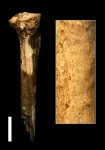(Press-News.org) URBANA, Ill. – Clinical testing is underway for a potentially groundbreaking new treatment for cystic fibrosis. Pioneered by scientists at Carle Illinois College of Medicine at the University of Illinois Urbana-Champaign and the Carver College of Medicine at the University of Iowa in partnership with the spin-out biotechnology company, cystetic Medicines, this promising inhalable molecular prosthetic is intended to improve lung function in people with CF who cannot benefit from current therapies.
The launch of this clinical trial is an important step forward in a joint public-private effort to develop a safe and effective treatment for everyone with CF, a progressive genetic disorder characterized by persistent lung infections that can cause severe damage over time.
“We're hopeful that for those who have held their breath for far too long, this could be a first opportunity to regain ion-channel-like function in the airway and thereby address CF at its roots,” said CI MED professor Martin Burke, who leads the research team in collaboration with scientists from the University of Iowa.
The first human volunteers in New Zealand recently began taking the new inhaled drug called CM001 (also known as amphotericin B cystetic for inhalation or ABCI), a molecular prosthetic that ‘stands in’ for missing or dysfunctional protein channels and is intended to restore more normal lung function in patients with cystic fibrosis. The approach combines a novel inhaled dry powder formulation to directly target the lungs and allow for more consistent dosing. “With this method, people with CF could directly deliver this molecular prosthetic to their lungs where they need it most, hopefully increasing its efficacy and safety,” Burke said. The ongoing clinical trial is intended to evaluate the new drug’s safety, tolerability, and movement through the body.
Cystic fibrosis is caused by mutations in the cystic fibrosis transmembrane conductance regulator (CFTR) gene responsible for producing the protein that helps regulate the balance of anions and fluid in the lining of the lungs and other organs. In the lungs, this dysfunction results in the formation of thick, sticky mucus on the lung lining that makes it difficult to breathe and causes frequent lung infections. About 90 percent of people with CF produce CFTR protein that doesn’t work properly. For these individuals, a class of drugs called CFTR modulators can often
restore protein-channel function and result in improved breathing. But treatments have been extremely limited for patients whose bodies produce little or no CFTR protein. Burke and his team are optimistic that CM001 can act as a prosthetic at the molecular scale, replacing the missing protein and restoring ion channel function. “The first impact we're hoping to achieve is by partnering with that final 10 percent of the CF community that cannot benefit from modulators to determine if we can provide benefit in a way that would address this fundamental defect,” Burke said.
While the new drug CM001 may be a game-changer for patients who are not treatable with CFTR regulators, other CF patients could benefit as well. “The concept of molecular prosthetics has the potential to alter the treatment landscape for cystic fibrosis in a profound way; in theory, it should work for all people dealing with the disease, regardless of the type of mutation they present,” said Jeffry Weers, Chief Technology Officer of cystetic Medicines and an industry leader in the development of inhalable medicines.
Burke, who is both a chemistry professor at the University of Illinois Urbana-Champaign and a medical doctor, says the development of this potential new treatment is powered by a translational, multi-disciplinary approach to solving health care problems. “We were able to get the all-star team together, and the whole mission of the company was to translate this basic science finding that happened here at Illinois and the University of Iowa into societal impact.” cystetic Medicines co-founder Dr. Michael Welsh from the University of Iowa is a leading expert on cystic fibrosis. His lab was instrumental in collaborating with Burke’s lab at UIUC throughout the research process, including foundational research studies.
“The collaboration between UIUC and the University of Iowa has been key in developing the molecular prosthetic approach to treat cystic fibrosis,” said Ian Thornell, a research assistant professor in the Division of Pulmonary, Critical Care and Occupational Medicine in the Department of Internal Medicine at the University of Iowa. He is also one of the key research collaborators. “UIUC has employed cutting-edge chemistry to design and test different molecular prosthetics, while the University of Iowa is one of nine basic science CF research hubs designated by the Cystic Fibrosis Foundation. The merging of technology developed at UIUC and Iowa’s CF expertise contributed to the success within the pre-clinical phase of this trial.”
People with CF have played a crucial role in earlier testing of the new treatment, said Agnieszka Lewandowska, a senior research scientist at UIUC, and a member of Burke’s lab. “We are grateful for the willingness of the CF community that provided cells through the University of Iowa’s Cystic Fibrosis Research Center that ultimately brought these compounds to clinical trial, Lewandowska said. “In collaboration with laboratories of Mike Welsh and Ian Thornell at the University of Iowa, we were able to demonstrate that ABCI, developed in partnership with cystetic Medicines and tested at UIUC, restores ion channel function to cells from people with CF.”
The work to develop a new treatment for the broad range of CF patients has also garnered financial support from both the public and private sectors, including a $25 million investment from Deerfield Management and support from Illinois Ventures. The non-profit Emily’s Entourage also supported early-stage research in the Burke and Welsh labs with grant funding.
Burke’s ambitions for the future impact of molecular prosthetics extend beyond CF treatments to other diseases and conditions. “Cystic fibrosis is one of hundreds of diseases that currently remain incurable because they're caused by loss of protein function,” Burke said. “The hope is that if we can succeed in CF, this molecular prosthetics approach could become a general way to treat diseases caused by loss of protein function.” He also expects innovators at the world’s first engineering-based college of medicine will play an important role in developing new molecular prosthetics. “There's a whole field around the intersection of engineering and prosthetic limbs. We’re now engineering prosthetics at the molecular scale. The whole goal of the technology that we're now building out at the Molecule Maker Lab at the Beckman Institute here at UIUC is to bring everybody into this exciting new space, including the brilliant physician-innovators at the Carle Illinois College of Medicine” Burke said.
Results of the clinical trial are expected in 2024.
Editor’s notes:
Previous research by UIUC and Iowa teams that support this work can be found in the journal Nature and the Journal of Cystic Fibrosis.
Dr. Martin Burke is a professor of Biomedical and Translational Sciences and the former associate dean for research at the Carle Illinois College of Medicine. He is the May and Ving Lee Professor for Chemical Innovation and holds professorships at the Beckman Institute for Advanced Science and Technology and the Carl R. Woese Institute for Genomic Biology. He is also affiliated with the Department of Biochemistry at UIUC. Learn more about the Burke Group research lab here.
Dr. Michael Welsh is Professor of Internal Medicine - Pulmonary, Critical Care, and Occupational Medicine at the Roy J. and Lucille A. Carver College of Medicine, at the University of Iowa.
END
A potential breakthrough treatment for cystic fibrosis enters clinical trial led by CI Med and U of Iowa researchers
2023-06-26
ELSE PRESS RELEASES FROM THIS DATE:
Ataxias: International Award for Bonn Patient Care and Research
2023-06-26
The Ataxia Center at the University Hospital Bonn (UKB) and DZNE have been awarded the title “Ataxia Center of Excellence” by the US National Ataxia Foundation (NAF) for their patient care and research – as the only organization in Europe. The foundation represents patient interests and is one of the world’s major non-governmental funders of ataxia research. These rare brain diseases are characterized by progressive loss of balance and coordination, accompanied by slurred speech. It is estimated that this condition affects around 16,000 women and men in Germany.
The NAF awarded the title “Ataxia ...
Men experience a long-term drop in semen quality after COVID infection – even if the infection was mild
2023-06-26
Copenhagen, Denmark: More than three months after suffering from mild COVID infection, men have lower sperm concentrations and fewer sperm that are able to swim, according to new findings presented today (Monday) at the 39th annual meeting of the European Society of Human Reproduction and Embryology (ESHRE) [1].
Professor Rocio Núñez-Calonge, scientific advisor at UR International Group at the Scientific Reproduction Unit, Madrid (Spain), said that after an average of 100 days following SARS-CoV-2 infection there appeared to be no improvement in sperm quality ...
Cheap and safe hormone treatment shows promise for couples with unexplained infertility
2023-06-26
Copenhagen, Denmark: A small study with couples experiencing unexplained infertility suggests that a hormone treatment could increase the chances of having a baby.
The trial, presented today (Monday) at the 39th annual meeting of the European Society of Human Reproduction and Embryology (ESHRE) [1], compared couples trying to conceive naturally with couples where the woman used a vaginal progesterone treatment during the second half of her menstrual cycle.
The researchers say a larger trial is now warranted but, given the treatment is safe and low-cost, it could ultimately benefit many people living with infertility around the world.
The study ...
50-million-year-old katydid fossil reveals muscles, digestive tract, glands and a testicle
2023-06-26
CHAMPAIGN, Ill. — 50 million years ago in what is now northwestern Colorado, a katydid died, sank to the bottom of a lake and was quickly buried in fine sediments, where it remained until its compressed fossil was recovered in recent years. When researchers examined the fossil under a microscope, they saw that not only had many of the insect’s hard structures been preserved in the compressed shale, so had several internal organs and tissues, which are not normally fossilized.
They describe their findings in the journal Palaeoentomology.
“Katydids ...
Are more babies born if embryos are cultured for three or five days in the lab? Largest randomised clinical trial to date suggests that age matters
2023-06-26
Copenhagen, Denmark: Women are just as likely to give birth to live babies after fertility treatment if embryos are transferred to their wombs three days after fertilisation in the laboratory rather than five. However, the women’s age can affect the outcomes, according to new research presented to the 39th annual meeting of the European Society of Human Reproduction and Embryology (ESHRE) [1].
Dr Simone Cornelisse, a researcher and resident in obstetrics and gynaecology at Radboud University Medical Center, Nijmegen (The Netherlands), told the conference that among 1202 women from 21 Dutch fertility centres who were randomly assigned to have embryos transferred to their wombs ...
Cancer risk among women with polycystic ovary syndrome doubles after menopause
2023-06-26
Copenhagen, Denmark: Women with polycystic ovary syndrome (PCOS) are not at any greater risk of ovarian cancer than those without the common hormone condition, say researchers. However, those with PCOS who have been through the menopause are more than twice as likely to be diagnosed with ovarian cancer.
The data based on nearly two million women is presented today (Monday) at the 39th annual meeting of the European Society of Human Reproduction and Embryology (ESHRE) [1]. The research is also published simultaneously in the International Journal of Cancer [2].
This ...
Humans’ evolutionary relatives butchered one another 1.45 million years ago
2023-06-26
Researchers from the Smithsonian’s National Museum of Natural History have identified the oldest decisive evidence of humans’ close evolutionary relatives butchering and likely eating one another.
In a new study published today, June 26, in Scientific Reports, National Museum of Natural History paleoanthropologist Briana Pobiner and her co-authors describe nine cut marks on a 1.45 million-year-old left shin bone from a relative of Homo sapiens found in northern Kenya. Analysis of 3D models of the fossil’s surface revealed ...
Childhood cancer: Vulnerability in the immune response against metastases discovered
2023-06-26
Scientists led by Sabine Taschner-Mandl, PhD, St. Anna Children's Cancer Research Institute, and Nikolaus Fortelny, PhD, Paris Lodron University of Salzburg, are the first to analyze bone marrow metastases from childhood tumors of the nervous system using modern single-cell sequencing analysis. It turns out that cancer cells prevent cells in their environment from fighting the tumor – a process that could be reversed with medication. The findings were published in the renowned journal Nature Communications.
Neuroblastoma is the most ...
Novel study deepens knowledge of treatment-resistant hypertension
2023-06-26
For many patients with hypertension—an elevated blood pressure that can lead to stroke or heart attack—medication keeps the condition at bay. But what happens when medication that physicians usually prescribe doesn’t work? Known as apparent resistant hypertension (aRH), this form of high blood pressure requires more medication and medical management.
Novel research from investigators in the Smidt Heart Institute at Cedars-Sinai, published today in the peer-reviewed journal Hypertension, found that aRH prevalence was lower in ...
Progesterone decreases night sweats & improves sleep in perimenopausal women
2023-06-26
New controlled trial research documents that Progesterone (micronized, oral) is effective at decreasing night sweats and improving sleep in perimenopausal women who have menstruated in the last 1-year. Perimenopausal women most want treatment for these two symptoms.
Current guidelines prescribe Menopausal Hormone Therapy (MHT) for disturbing hot flushes/flashes or night sweats (vasomotor symptoms, VMS) in all women younger than 60 years.
“This guideline assumes that hormone levels and symptoms are the same in the early years of ...




